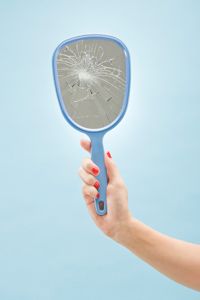Mirrors in Literature and Superstition
Science aside, mirrors have always possessed a certain spooky otherworldliness. Magic mirrors in literature abound, from the ancient story of Narcissus, who fell in love with and pined for his own reflection in a pool of water, to present-day urban legends about summoning Bloody Mary by saying her name three times into a mirror. Snow White's queen had a magic mirror and Alice traveled through the looking glass to the other side. In ancient Chinese mythology, there's the story of the Mirror Kingdom, where creatures are bound by magic to sleep but will one day rise again to do battle with our world. Strange movements we see in mirrors out of the corners of our eyes are supposedly the first stirrings of this world as it wakes up.
Mirrors also have a strong connection to the concept of the soul, which results in a wealth of superstition. For instance, one of the reasons that breaking a mirror causes seven years of bad luck (on top of having to pay for the mirror) is that the soul, thought to regenerate every seven years, shatters with the broken mirror. Vampires, who have no souls, are thus invisible to mirrors. It's also dangerous for babies, whose souls are undeveloped, to look into mirrors before their first birthday or they will become stutterers.
Advertisement
Spirits are often associated with mirrors. Mirrors are covered out of respect for the dead during the Jewish mourning ritual of sitting shiva, but in many people in the U.S. also cover their mirrors when someone dies. According to superstition, a mirror can trap a dying soul. A woman who gives birth and looks in a mirror too soon afterward will also see ghostly faces peek out from behind her reflection. What's more, rumor has it that if you go to a mirror on New Year's Eve with a candle in your hand and call out the name of a dead person in a loud voice, the power of the mirror will show you that person's face.
Spooked yet? For more information on mirrors and superstitions, visit some of the links below.
Related HowStuffWorks Articles
Sources
- Anderson, Miranda. "The Book of the Mirror: An Interdisciplinary Collection Exploring the Cultural Story of the Mirror." Cambridge Scholars Publishing. 2007.
- Avril, Tom. "At Drexel He Designs Amazing Mirrors." Philadelphia Inquirer. January 12, 2009. (March 28, 2009)http://www.philly.com/inquirer/magazine/37429749.html
- Bonnerjea, Biren. "A Dictionary of Superstitions and Mythology." Singing Tree Press. 1969.
- Borges, Jorge Luis. "The Book of Imaginary Beings." Penguin Group. 2005.
- Bower, Bruce. "I, Magpie." Science News. September 13, 2008. (March 30, 2009)http://www.sciencenews.org/view/generic/id/35462/title/I,_Magpie
- Christopher G. De Pree, Ph.D. "Physics Made Simple." Broadway Books. 2004
- Enoch, J.M. "History of Mirrors Dating Back 8000 Years." Optometry and Vision Science Vol. 83 No. 10. American Academy of Optometry. 2006. http://www.optvissci.com/pt/re/ovs/pdfhandler.00006324-200610000-00017.pdf;jsessionid=JTmTQX8RZjTrh1x1Sj2NJHQmh9QW169SK0W21YLcLSlKMg3hxNXh!285259918!181195628!8091!-1
- Feynman, Richard P. "Six Not So Easy Pieces." Basic Books. 1998.
- Martin, Samantha. "We Still Find It Hard to Understand How Mirrors Work." Medical News Today. December 27, 2005. (March 29, 2009)http://www.medicalnewstoday.com/articles/35279.php
- Melchior-Bonnet, Sabine. "The Mirror: A History." Routledge. 2002.
- Encyclopaedia Britannica Online. "Mirror." (March 30, 2009)http://www.britannica.com/EBchecked/topic/385037/mirror
- O'Mara, Richard. "Here's Looking at You." Baltimore Sun. November 23, 1998. (March 28, 2009)http://www.truemirror.com/press/pdj%5Ctmc_baltimoresun.1198.pdf
- Palmer, Jack and Palmer, Linda. "Consciousness and the Symbolic Universe." Pearson Higher Education. 2003.http://www.ulm.edu/~palmer/ConsciousnessandtheSymbolicUniverse.htm
- Panek, Richard. "Seeing and Believing." Viking. 1998.
- Parker, Sybil P. "Dictionary of Physics." McGraw-Hill. 1994.
- Talaris Institute. "I'm Embarrassed!" (March 31, 2009)http://www.talaris.org/spotlight_embarrassed.htm
